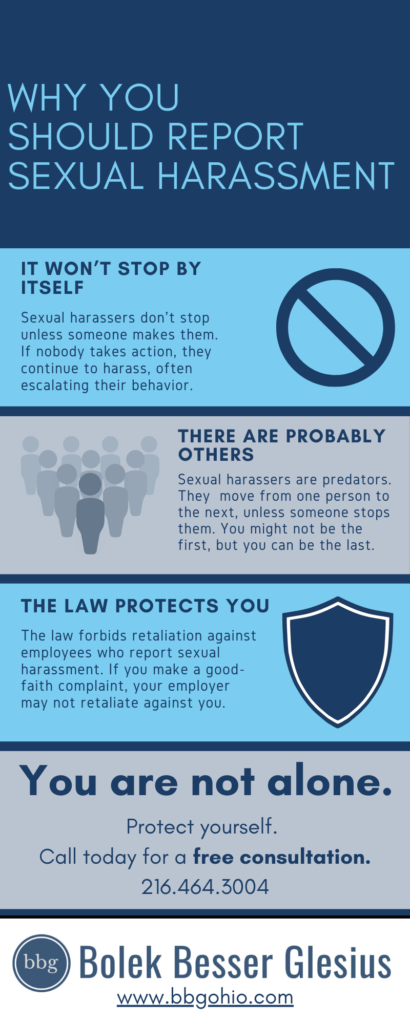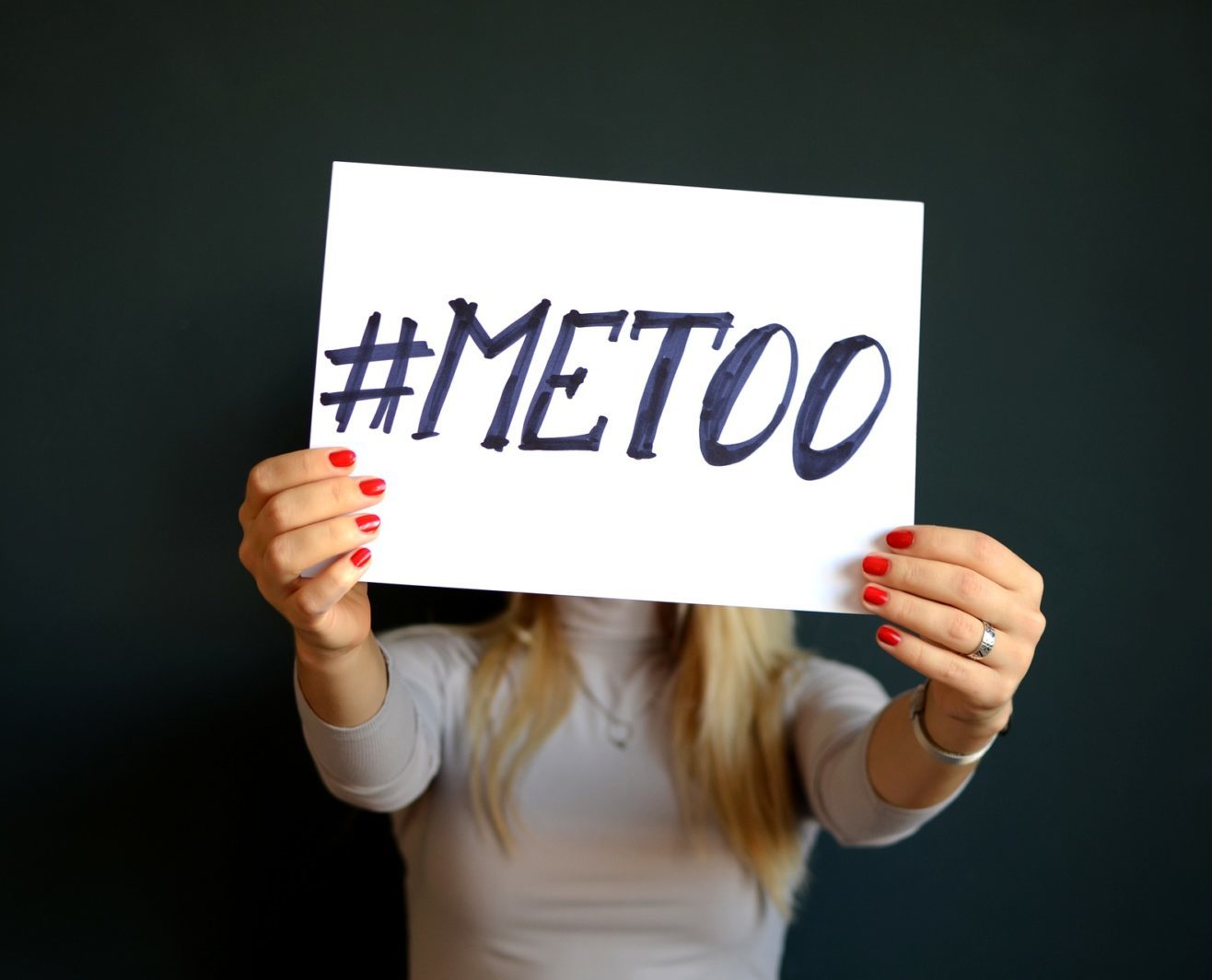Sexual Harassment Lawyer Protecting Cleveland Employees
You have the right to be free from sexual harassment. If you are facing sexual harassment at work, get help from a sexual harassment attorney at Bolek Besser Glesius in Cleveland.
 What is sexual harassment?
What is sexual harassment?
The sexual harassment definition is generally described as unwelcome sexual advances, requests for sexual favors, and other verbal or physical conduct of a sexual nature in the workplace. There are two types of sexual harassment.
The first is “quid pro quo” harassment, which is when terms and conditions of the job depend on submitting to a sexual advance. The classic example is the boss who says “Sleep with me or you’re fired,” and then fires the employee for refusing. Harassment is usually more subtle than that. Still, an employer may not condition getting some benefit (like a promotion or a raise) or avoiding some negative action (like a suspension, demotion, or firing) on an employee giving in to unwelcome sexual conduct.
The second type is what’s commonly known as “hostile work environment” harassment. This type of harassment includes unwelcome sexual comments or other sexual conduct that has the purpose or effect of unreasonably interfering with an employee’s ability to do the job, or that creates an intimidating, hostile, or offensive working environment. Some examples include:
- Offensive sexual jokes, slurs, epithets, or name calling;
- Sexual assault, groping, or touching;
- Sexual remarks about a person’s physical appearance or clothes;
- Intimidation, ridicule, or mockery; or,
- Showing offensive objects or pictures, such as pornography.
To be illegal, the conduct must be what’s called “severe or pervasive.” Petty slights, annoyances, and isolated incidents (unless they are severe) are not typically illegal. Whether conduct in a given case meets this technical legal sexual harassment definition is not always easy to know. An experienced sexual harassment attorney can help you understand the difference in your case.
Is my employer liable for sexual harassment?

Both men and women can be a harasser or a victim of sexual harassment. A harasser might a supervisor, co-worker, an executive, or even a customer or client. Under certain circumstances, a harasser might even be the same sex as the victim.
Different legal standards determine whether an employer will be liable for harassment depending on who the harasser is. That means employer liability in sexual harassment cases is a complex question that requires guidance from a skilled sexual harassment lawyer.
When the harasser is a supervisor, employer liability depends the type of harassment involved:
- If the harassment results in termination, failure to promote, or another decision causing a significant change in benefits or responsibilities, the employer is automatically liable (assuming the employee proves the harassment).
- If the harassment is instead a hostile work environment, the employer is liable unless it proves an affirmative defense. The company must show it exercised reasonable care to prevent and promptly correct harassing behavior, and that the employee unreasonably failed to take advantage of any employer anti-harassment policy.
Under a 2013 U.S. Supreme Court case, Vance v. Ball State University, a “supervisor” includes only those individuals “empowered by the employer to take tangible employment actions against the victim.” If the harasser does not qualify as a supervisor, the employer will usually be liable only if it was negligent. In practice, that depends on whether the company knew, or should have known, that the harasser posed a risk to others in the workplace. In other words, were there prior complaints about the harasser? Employers can be quite sneaky at hiding this evidence. But the sexual harassment lawyers at Bolek Besser Glesius know where to find it.
Available damages in harassment cases
Victims of sexual harassment are entitled to a variety of remedies. They include back pay, front pay, and other out-of-pocket expenses incurred as a result of the harassment. The employee can also recover pain and suffering damages for emotional distress. In addition, both Ohio and federal law allow the employee to recover punitive damages against the employer in some circumstances, designed to punish malicious conduct and deter others in the future. Lastly, employees may be able to recover the attorney fees of their sexual harassment attorney, and the costs of pursuing their rights in court.
Protecting employees from retaliation at work
There are many reasons why victims do not report sexual harassment. Victims often mistakenly feel they are somehow to blame (they most definitely are not). They might also feel guilt or shame. And perhaps most of all, they might fear retaliation. Fortunately, sexual harassment law forbids retaliation against individuals who oppose or report it.

Both Title VII and Ohio Revised Code Chapter 4112 provide a separate cause of action for employees when their employer retaliates for making a good faith complaint of sexual harassment. When an employee reports or otherwise opposes sexual harassment, an employer may not take any negative action against the employee as a result, if the action taken would dissuade a reasonable person from coming forward.
It is important to understand that if you report sexual harassment, you need not actually be proven right to be protected from retaliation. As long as you make a report in good faith, you are protected. In fact, because a retaliation claim is a separate cause of action, in some cases an employee might prevail on such a claim, even if he or she cannot prove sexual harassment.
It takes courage to report sexual harassment. But you should report it. Not only does the law protect you if you do, it might not protect you if you don’t: you can’t expect the harassment to stop unless you take action. Most sexual harassers will continue until someone stops them. We have seen many times when the harasser’s conduct got much worse because nobody stopped him. And chances are you are not the only victim. It is not uncommon for harassers to move from one victim to the next because nobody stops them. At some point, someone has to speak out.
Call a sexual harassment lawyer today
You don’t have to tolerate sexual harassment in the workplace. Protect yourself. Contact us for a free consultation with a sexual harassment attorney.
We have helped countless women who have faced–and overcome–sexual harassment, and even sexual assault, in Cleveland and throughout Northeast Ohio. You are not alone.

